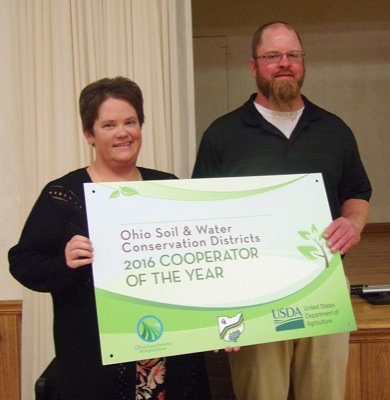Wednesday, November 16th, 2016
Albers re-elected to SWCD board
Outstanding Cooperator award goes to area couple
By Nancy Allen

Photo by Nancy Allen/The Daily Standard
Todd and Kari Vehorn received the Outstanding Cooperator Award on Tuesday during the Mercer County Soil and Water Conservation District's annual banquet meeting at the Coldwater American Legion hall.
COLDWATER - Dale Albers, Celina, was re-elected to the Mercer County Soil and Water Conservation District board of supervisors during the district's 72nd annual banquet meeting Tuesday.
Albers' three-year term begins Jan. 1. Also running for the open seat on the board was Jason Gallman, Mendon.
The meeting was held at the Coldwater American Legion hall.
Albers is a machinist and farms about 200 acres in Mercer County with the help of his father. He grows soybeans, corn, wheat and hay and raises angus steers. He began his first term in 2014.
Todd and Kari Vehorn, Wendelin, won the Outstanding Cooperator Award. Todd Vehorn raises grass-fed beef using intensive grazing and wet wrap feed, depending on the time of year. The couple also raises hogs that are fed non-GMO grain and forage. They plant corn and soybeans and use 100 percent no-till and winter cover crops.
The many conservation practices they have installed include cover crops, grass waterways that decrease soil erosion, wetlands, seeding for pasture, rotational grazing, filter strips, field borders and fencing. They are in the design stage of constructing a manure-storage building and a cover for their feed lot.
Also recognized were Coldwater High School student Lilly Vagedes as the individual winner of the agriculture portion of the annual county soils judging contest and Fort Recovery High School student Logan Ranly for the highest score in the urban portion of the contest. Both girls received plaques. Participating students judged soils for urban or agricultural purposes and took a written exam.
District technician Matt Heckler talked about the importance of pollinators, noting honeybees contribute to billions of dollars worth of crops in the United States annually. Other pollinators include bats, hummingbirds, butterflies, moths and other insects.
"We don't think of pollinators as much in Mercer County because corn, soybeans and wheat don't require them as much, but three-fourths of the earth's flowering plants and most fruits are dependent on pollinators," Heckler said. "Bees are the main pollinators for fruits and vegetables."
Heckler explained county officials are participating in the first statewide pollinator initiative this year collecting more than 5,000 milkweed seed pods. The plant is the sole food source for the monarch butterfly caterpillar.
"The seeds will be sorted by (prison) inmates and 10 percent of the seeds will come back to Mercer County for planting," he said.
The St. Henry FFA chapter collected six boxes of pods, the most by any county group, he said.
Heckler said milkweed seeds will be planted at seven county sites this spring. The local Pheasants Forever chapter will pay for the seeds. Federal conservation dollars are available to help landowners pay for additional pollinator sites. People can learn more about these funds at the Mercer County Farm Service Agency.
Featured speaker and cover crop and soil health specialist Hans Kok gave a presentation comparing agriculture in his native Netherlands to that in Ohio. He first visited the U.S. in 1984 as an exchange student. He fell in love with the country and moved here, he said. His wife is from Columbus, Indiana.
The Netherlands is one-third of the size of Ohio with a population of 16.4 million people; Ohio has 11.5 million. The Netherlands is the second-largest exporter of food and agricultural products after the U.S. Cut flowers, dairy, pork, vegetables and beef are that country's top five ag products. The top five in the U.S. are soybeans, corn, dairy, greenhouse products and hogs. The success of Netherlands' agriculture is based on the high value, not the size of its crops, he said.
Farmland in his homeland is two to four times as expensive as in Ohio, and its agriculture is highly subsidized. The country has much stricter regulations on chemical use in agriculture and instead uses innovative means of pest control, including placing snakes and salamanders in a greenhouse.
Netherlands' residents spend more than 14 percent of their net income on food, not including dining out. People in the U.S. spend less than 10 percent of their net income on food.
